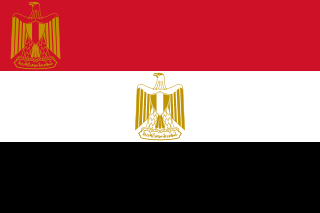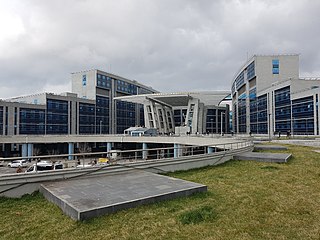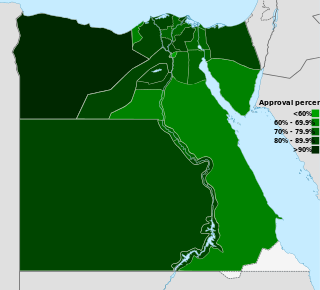
The Politics of Yemen are in an uncertain state due to the Houthi takeover in Yemen. An armed group known as the Houthis or Ansar Allah seized control of the Northern Yemeni government and announced it would dissolve parliament, as well as install a "presidential council", "transitional national council", and "supreme revolutionary council" to govern the country for an interim period. However, the deposed president, Abdrabbuh Mansur Hadi, has declared he is still in office and is working to establish a rival government in Aden.

The politics of Tunisia takes place within the framework of a unitary semi-presidential representative democratic republic, with a President serving as head of state, Prime Minister as head of government, a unicameral legislature and a court system influenced by French civil law. Between 1956 and 2011, Tunisia operated as a de facto one-party state, with politics dominated by the secular Constitutional Democratic Rally (RCD) under former Presidents Habib Bourguiba and then Zine el Abidine Ben Ali. However, in 2011 a national uprising led to the ousting of the President and the dismantling of the RCD, paving the way for a multi-party democracy. October 2014 saw the first democratic parliamentary elections since the 2011 revolution, resulting in a win by the secularist Nidaa Tounes party with 85 seats in the 217-member assembly.

The President of Egypt is the executive head of state of Egypt and the defacto appointer of the official head of government under the Egyptian Constitution of 2014. Under the various iterations of the Constitution of Egypt following the Egyptian Revolution of 1952, the president is also the supreme commander of the Armed Forces, and head of the executive branch of the Egyptian government. The current president is Abdel Fattah el-Sisi, in office since 8 June 2014.

The current Constitution of France was adopted on 4 October 1958. It is typically called the Constitution of the Fifth Republic, and it replaced the Constitution of the Fourth Republic of 1946 with the exception of the preamble per a Constitutional Council decision in July 1971. The current Constitution regards the separation of church and state, democracy, social welfare, and indivisibility as core principles of the French state.

The Constitution of the Republic of Lithuania defines the legal foundation for all laws passed in the Republic of Lithuania. It was approved in a referendum on 25 October 1992.

The Constitution of the Italian Republic was enacted by the Constituent Assembly on 22 December 1947, with 453 votes in favour and 62 against. The text, which has since been amended sixteen times, was promulgated in an extraordinary edition of Gazzetta Ufficiale on 27 December 1947. The Constituent Assembly was elected by universal suffrage on 2 June 1946, on the same day as the referendum on the abolition of the monarchy was held. The election was held in all Italian provinces. The Constitution was drafted in 1946 and came into force on 1 January 1948, one century after the Constitution of the Kingdom of Italy, the Statuto Albertino, had been enacted.

Bahrain has had two constitutions in its modern history. The first one was promulgated in 1973, and the second one in 2002.
The Constitution of the Republic of Iraq is the fundamental law of Iraq. The first constitution came into force in 1925. The current constitution was adopted on September 18, 2005 by the Transitional National Assembly of Iraq, and confirmed by constitutional referendum, held on October 15, 2005. It was published on December 28, 2005 in the Official Gazette of Iraq, in Arabic original, and thus came into force. Official translation for international use was produced in cooperation between Iraqi state authorities and the United Nation's Office for Constitutional Support. Since 2006, several proposals for adoption of various constitutional amendments were initiated. The Kurdish language is official at state level.

The Constitution of the Arab Republic of Egypt was the former constitution of Egypt. It was adopted on 11 September 1971 through a public referendum. It was later amended in 1980, 2005, and 2007. It was proclaimed to update the democratic representative system in assertion of the rule of law, independence of the judiciary, and party plurality. On 13 February 2011, the Constitution was suspended following the resignation of President Hosni Mubarak as a result of the 2011 Egyptian Revolution. On 30 March 2011, it was "effectively voided" after a new provisional constitution was passed by the country's ruling Supreme Council of the Armed Forces. It has since been superseded by the Egyptian Constitution of 2012 and the current Egyptian Constitution of 2014.

The Constitution of Armenia was adopted by a nationwide Armenian referendum on July 5, 1995. This constitution established Armenia as a democratic, sovereign, social, and constitutional state. Yerevan is defined as the state's capital. Power is vested in its citizens, who exercise it directly through the election of government representatives. Decisions related to changes in constitutional status or to an alteration of borders are subject to a vote of the citizens of Armenia exercised in a referendum. There are 117 articles in the 1995 constitution. On November 27, 2005, a nationwide constitutional referendum was held and an amended constitution was adopted. The constitution was amended again in a national referendum on December 6, 2015 that changed the political structure from a semi-presidential system to a parliamentary republic.

The Constitution of the Republic of Chad is the supreme law of Chad. Chad's seventh constitution, it was adopted in 1996, six years after President Idriss Déby rose to power following a successful rebellion against President Hissène Habré, this formal document establishes the framework of the Chadian state and government and enumerates the rights and freedoms of its citizens. In its current form, the contents of the Constitution include a preamble, 16 parts and 225 articles.

The current Constitution of Madagascar was, according to the national electoral commission, endorsed by a majority of voters in the constitutional referendum held on 14 November 2010. The new constitution launched the Fourth Republic of Madagascar and was widely seen as an attempt to consolidate and legitimise the rule of Andry Rajoelina and his High Transitional Authority government which was installed after a military-backed coup d'état against President Marc Ravalomanana at the beginning of the ongoing national political crisis. One substantive change from the constitution of the Third Republic was to lower the minimum age for presidential candidates from 40 to 35. This made Rajoelina, aged 36 at the time, eligible to stand in presidential elections.

The Constitution of the Philippines is the constitution or supreme law of the Republic of the Philippines. Its final draft was completed by the Constitutional Commission on October 12, 1986, and was ratified by a nationwide plebiscite on February 2, 1987.

The Constitution of Ivory Coast was approved by referendum on October 30, 2016 and officially adopted on November 8, 2016.

The Constitution of the Republic of Turkey, also known as the Constitution of 1982, is Turkey's fundamental law. It establishes the organization of the government and sets out the principles and rules of the state's conduct along with its responsibilities in regards to its citizens. The constitution also establishes the rights and responsibilities of the latter while setting the guidelines for the delegation and exercise of sovereignty that belongs to the Turkish people.

A constitutional referendum was held in Egypt on 19 March 2011, following the 2011 Egyptian revolution. More than 14 million (77%) were in favour, while around 4 million (23%) opposed the changes; 41% of 45 million eligible voters turned out to vote.

The politics of France take place with the framework of a semi-presidential system determined by the French Constitution of the French Fifth Republic. The nation declares itself to be an "indivisible, secular, democratic, and social Republic". The constitution provides for a separation of powers and proclaims France's "attachment to the Rights of Man and the principles of national sovereignty as defined by the Declaration of 1789."
Following the 2011 Egyptian revolution, the Muslim Brotherhood in Egypt became one of the main forces contending for political power in Egypt against the Supreme Council of the Armed Forces (SCAF) and other established centers of the former Hosni Mubarak regime.

The Provisional Constitution of the Federal Republic of Somalia is the supreme law of Somalia. It provides the legal foundation for the existence of the Federal Republic and source of legal authority. It sets out the rights and duties of its citizens, and defines the structure of government. The Provisional Constitution was adopted on August 1, 2012 by a National Constitutional Assembly in Mogadishu, Banaadir.

The 1973 Constitution of the Syrian Arab Republic was adopted on 13 March 1973 and was in use until 27 February 2012. It describes Syria's character to be Arab, democratic, and republican. Further, in line with pan-Arab ideology, it positions the country as a region of the wider Arab world and its people as an integral part of the Arab nation. It entrenched the power of the Arab Socialist Ba'ath Party, its Article's original 8 describing the party as "the leading party in the society and the state", even if Syria was not, as is often believed, a one-party system in formal terms.


















